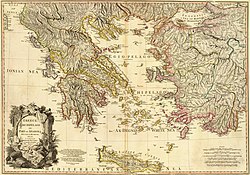
Back Griekse Donker Eeue AF Dunkle Jahrhunderte (Antike) ALS العصور المظلمة اليونانية Arabic Edá escura griega AST Qaranlıq əsrlər (Qədim Yunanıstan) AZ Грэчаскія Цёмныя стагоддзі BE Ранножелязна епоха (Гърция) Bulgarian গ্রিক অন্ধকার যুগ Bengali/Bangla Edat fosca grega Catalan Temné období Czech
| Geographical range | Greek mainland and Aegean Sea |
|---|---|
| Period | Ancient Greece |
| Dates | c. 1200–800 BC |
| Characteristics | Destruction of settlements and collapse of the socioeconomic system |
| Preceded by | Mycenaean Greece, Minoan civilization |
| Followed by | Archaic Greece |
| History of Greece |
|---|
 |
|
|
The Greek Dark Ages (c. 1200–800 BC) were earlier regarded as two continuous periods of Greek history: the Postpalatial Bronze Age (c. 1200–1050 BC)[1] and the Prehistoric Iron Age or Early Iron Age (c. 1050–800 BC), the last included all the ceramic phases from the Protogeometric to the Middle Geometric [1] and lasted until the beginning of the Protohistoric Iron Age around 800 BC.[2][3] Currently, the term Greek Dark Ages is being abandoned, and both periods are not considered "obscure".[4]
At the beginning of the Postpalatial Bronze Age, the so-called Late Bronze Age collapse of civilization in the Eastern Mediterranean world in c. 1200–1150 BC took place, as the great palaces and cities of the Mycenaeans were destroyed or abandoned. At around the same time, the Hittite civilization also suffered serious disruption, with cities from Troy to Gaza being destroyed. In Egypt, the New Kingdom fell into disarray, leading to the Third Intermediate Period of Egypt. Following the collapse, there were fewer, smaller settlements, suggesting widespread famine and depopulation. In Greece, the Linear B script used by Mycenaean bureaucrats to write the Greek language ceased to be used, and the Greek alphabet did not develop until the beginning of the Protohistoric Iron Age, c. 800 BC.[5]
- ^ a b Knodell 2021, p. 7 Table 1.
- ^ "The History of Greece". Hellenicfoundation.com. Archived from the original on 2016-12-07. Retrieved 2024-04-21.: "The period from 1100 to 800 B.C. is known as the Dark Age of Greece. As described in the Ancient Greek Thesaursus: Throughout the area there are signs of a sharp cultural decline. Some sites, formerly inhabited, were now abandoned."
- ^ Martin, Thomas R., (October 3, 2019). "The Dark Ages of Ancient Greece" Archived 2020-10-26 at the Wayback Machine: "... The Near East recovered its strength much sooner than did Greece, ending its Dark Age by around 900 B.C. ... The end of the Greek Dark Age is traditionally placed some 150 years after that, at about 750 B.C. ..." Retrieved October 24, 2020
- ^ Knodell 2021, p. 11: "[T]he pejorative notions and interpretive bias that the term 'Dark Age' introduces have led to the adoption of the more neutral 'Early Iron Age' as the predominant referent".
- ^ Knodell 2021, p. 11.